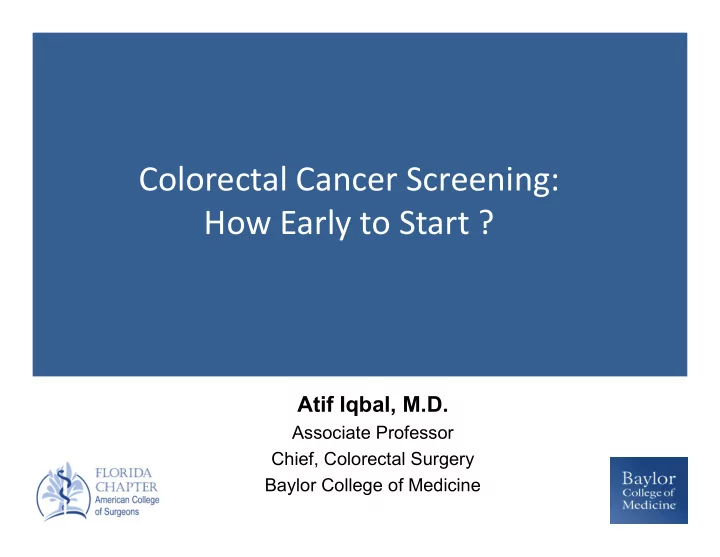

Colorectal Cancer Screening: How Early to Start ? Atif Iqbal, M.D. Associate Professor Chief, Colorectal Surgery Baylor College of Medicine
Disclosures None
Colorectal cancer estimates (2018) • 140,250 new cases expected in US • 50,630 deaths estimated • 1.2 million Americans with CRC
Declining CRC Mortality Siegel et al CEBP 2015
Reason for Declining Mortality • SCREENING Polyp removal Early cancer detection WHEN TO START SCREENING? Early 2018 Guidelines said 50 years
ACS (2018) USPSTF (2016) Age to start 45 yr 50 yr screening High‐sensitivity stool‐based test OR a Different methods can be Choice of test structural exam used • • FIT annually FIT annually • • HSgFOBT annually HSgFOBT annually • • mt‐sDNA every 3y mt‐sDNA every 1y or 3y • • Colonoscopy every 10y Colonoscopy every 10y Acceptable • • CTC every 5y CTC every 5y test options • • FS every 5y FS every 5y • FS every 10y + FIT every yr • • Continue to 75 yr as long as good 76‐85 yr: Individual Age to stop health and life expectancy 10+ yr decision making • • screening 76‐85 yr: Individual decision making >85 yr: discouraged • >85 yr: discouraged from screening from screening
Reasoning for starting screening at 45 y
Rising incidence in younger population CRC Colon Rectum 1990 6.4% 5.8% 8.0% 2000 7.9% 6.5% 11.6% 2010 10.7% 9.2% 14.3% 2015 12.4% 11.1% 15.4%
ACS (2018) USPSTF (2016) Age to start 45 yr 50 yr screening High‐sensitivity stool‐based test OR a Different methods can be Choice of test structural exam used • • FIT annually FIT annually • • HSgFOBT annually HSgFOBT annually • • mt‐sDNA every 3y mt‐sDNA every 1y or 3y • • Colonoscopy every 10y Colonoscopy every 10y Acceptable • • CTC every 5y CTC every 5y test options • • FS every 5y FS every 5y • FS every 10y + FIT every yr • • Continue to 75 yr as long as good 76‐85 yr: Individual Age to stop health and life expectancy 10+ yr decision making • • screening 76‐85 yr: Individual decision making >85 yr: discouraged • >85 yr: discouraged from screening from screening
Rectal cancer patients under 50 years of age lack a survival benefit from NCCN guideline-directed treatment for stage II and III disease Andrew Kolarich; Thomas J. George, Jr; Steven J. Hughes; Daniel Delitto, MD; Carmen J. Allegra; William A. Hall; George J. Chang; Sanda A. Tan; Christiana M. Shaw; Atif Iqbal
Patients < 50 years old Patients 50 ‐ 75 years old p value n % of total n % of total Gender Female 3791 41.5% 12269 36.1% <0.001 Race Caucasians 7626 85.5% 29429 87.9% African‐Americans 838 9.3% 2629 7.9% <0.001 Asian & Pacific 415 4.6% 1245 3.7% Islanders Spanish Origin Hispanic 677 7.8% 1831 5.7% <0.001 Insurance Status Uninsured 590 6.6% 1469 4.4% <0.001 Patients < 50 years old Patients 50 ‐ 75 years old p value n % of total n % of total Stage at Diagnosis Stage I 2194 33.2% 9586 39.1% Stage II 1756 26.6% 7296 29.7% <0.001 i Stage III 2663 40.3% 7656 31.2% Tumor Differentiation Well 657 8.3% 2583 8.7% differentiated Moderately 6178 77.7% 23391 79.0% differentiated <0.001 j Poorly 1034 13.0% 3362 11.3% differentiated Undifferentiated, 83 1.0% 290 1.0% anaplastic Histology Adenocarcinoma 8521 93.4% 32130 94.6% Mucinous < 0.001 k 500 5.5% 1677 4.9% Signet ring cell 105 1.2% 173 0.5%
Rectal cancer patients under 50 years of age lack a survival benefit from NCCN guideline-directed treatment for stage II and III disease Andrew Kolarich; Thomas J. George, Jr; Steven J. Hughes; Daniel Delitto, MD; Carmen J. Allegra; William A. Hall; George J. Chang; Sanda A. Tan; Christiana M. Shaw; Atif Iqbal
Rectal cancer patients under 50 years of age lack a survival benefit from NCCN guideline-directed treatment for stage II and III disease
Thank you
Recommend
More recommend